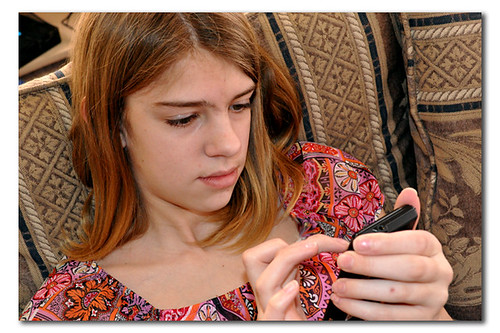If you are a parent, guardian, or grandparent of an adolescent, chances are you have wondered if the time they spend on social media is impacting their mental health. The topic of social media and mental health has been a concern that has only increased with the onset of the pandemic. According to Dr. Weigle in an interview aired by PBS NewsHour, isolation during the pandemic has resulted in decreased in-person connection, which therefore, escalated adolescents’ need to connect through social media (2021, 24:58). Dr. Weigle also points out, this increased use causes poor sleeping habits, resulting in negative impacts on the overall health of adolescents (PBS NewsHour, 2021, 19:55). Additionally, Dr. Weigle advises parents to be involved with their children, create “screen-free time” especially at dinner and around bedtime, and lead by example (PBS NewsHour, 2021, 20:19).
You can find the full interview with Dr. Weigle here: https://youtu.be/W5yyy_TxC0M
What parents believe…
A survey of over 2,900 parents conducted by Lurie Children’s Hospital focused on parents’ concerns with social media (WGN News, 2020, 1:02). First, the results indicated that “68% of parents … believe social media affects their teen’s ability to socialize normally” (WGN News, 2020, 1:44). Second, 56% of parents are concerned their teens are using social media to seek attention and approval from their peers (WGN News, 2020, 1:52). Third, 67 % of parents surveyed are worried that their teen is dependent on social media (WGN News, 2020, 1:58). Finally, parents were concerned with social media content stating it was “too sexual” (51%), led to cyberbullying (25%), and included hate speech (24%) (WGN News, 2020, 2:17).
You can find the full report here: https://youtu.be/KKgz22Ag4ao
What teens are saying…
While parents and experts are concerned with adolescences’ exposure to social media, many teens acknowledge feeling the pressure social media brings. In a recent report, teenager Macy Cabrera admits to feeling inadequate and judged by peers (FOX 61, 2021, 00:33). In addition, her friend Ella Adams explains how seeing pictures of others on social media makes teens compare themselves and lowers their self-esteem (FOX 61, 2021, 00:49). Another news report features Laynie Ferriman, a 17-year-old, discussing how social media causes a negative body image and lacks diversity (WCIA News, 2021, 00:50) She goes on to describe how she needs to occasionally disconnect from social media to help combat self-hate (WCIA News, 2021, 01:03). Lastly, CBS Mornings co-host, Nate Burleson, spoke to his 11-year-old daughter about how she feels social media impacts her life (CBS Mornings, 2021, 00:15). His daughter, Mia, confesses to using social media for over 8 hours a day and previously being addicted to TikTok (CBS Mornings, 2021, 01:46). Mia also discloses that even though she receives lots of positive reinforcement at home, she still compares herself to others she views on social media (CBS Mornings, 2021, 01:57).
You can find all three teen videos here: FOX 61 https://youtu.be/DO35jiBGDC0
WCIA News – https://youtu.be/8X0Ixu51JI0 and CBS Mornings – https://youtu.be/xvmeizvQIL
What has research found…
In 2018, Berryman & Ferguson had their study published after evaluating questionnaires they provided to 465 teens that focused on the impact social media has on mental health. The surveys included the following: vaguebooking (posting attention seeking posts), hours spent on social media, social media importance, mental health symptoms, social support, parent-child relationship, social anxiety, histrionic symptoms, a need to belong, loneliness, compassion, and socially desirable responding (Berryman & Ferguson, 2018). According to the results, there was only a small connection between social media and these areas assessed (Berryman & Ferguson, 2018). Although, vaguebooking “slightly predicted both loneliness and suicidal thoughts” (Berryman & Ferguson, 2018). Furthermore, their study showed that social support is beneficial in reducing mental health problems (Berryman & Ferguson, 2018). In contrast, results indicated that strained parent-child relationships may have a strong impact on mental health in young adults (Berryman & Ferguson, 2018).
You can find their full study here: https://doi.org/10.1007/s11126-017-9535-6
Two additional studies published in 2020 had similar results, showing very little evidence that social media affects mental health. The first by Odgers & Jensen (2020) pointed out that prior studies mostly involved adults and not teenagers. They evaluated information from several previous reports, and they concluded there was no valid association between social media use and symptoms of depression (Odgers & Jensen, 2020). They added, it is very unlikely that social media may lead to mental health issues in teenagers (Odgers & Jensen, 2020). Next, an 8-year study by Coyne et al. (2020) analyzed the hours spent on social media and how it relates to mental health disorders. The results indicated that the time spent on social media had no relationship to symptoms of depression or anxiety (Coyne et al., 2020). They emphasized the importance of conducting further review of what teenagers are doing on social media rather than the amount of time they spend on their devices (Coyne et al., 2020).
You can find their studies here: https://doi.org/10.1111/jcpp.13190 (Odgers and Jensen) and https://doi.org/10.1016/j.chb.2019.106160 (Coyne et al.)
In contrast, O’Reilly (2020) discovered when teenagers were asked directly, they recognized the connection between social media and strain on their self-worth, sleep habits, and the need to be included and liked. Moreover, the teens talked about the potential for bullying and mental health issues because of social media (O’Reilly, M., 2020). However, the results also indicated that teenagers found social media sometimes decreased stress by taking their mind off potential stressors (O’Reilly, M., 2020).
You can find the study by O’Reilly here: https://doi.org/10.1080 /09638237.2020.1714007

By: Blogtrepreneur
What does this all mean…
It is obvious that there are concerns about the influence social media has on the mental health of teenagers. Any Google search will result in numerous news reports, studies, and opinions on the subject. With such a variety of search results, how do parents and guardians know if their teenager is being negatively impacted? One important piece to note, the media and articles found offering a teenagers perspective indicate they are aware of the possible negative and positive impacts social media can have. This suggests that further research is warranted to assess the specific impacts social media has on their mental health. It also provides evidence that open communication with teenagers is crucial when evaluating any connection social media has on their mental health. Furthermore, a strong parent-child relationship could potentially decrease any negative influence associated with using social media. In the end, social media is here to stay and, therefore, this subject will continue to need evaluating.
References
Berryman, C., Ferguson, C. J., & Negy, C. (2018). Social Media Use and Mental Health among Young Adults. Psychiatric Quarterly, 89(2), 307–314. https://doi.org/10.1007/s11126-017-9535-6
CBS Mornings. (2021, October 14). Social media and its effects on youth development and mental health. [Video]. YouTube. https://youtu.be/xvmeizvQILc
Coyne, S. M., Rogers, A. A., Zurcher, J. D., Stockdale, L., & Booth, M. (2020). Does time spent using social media impact mental health?: An eight year longitudinal study. Computers in Human Behavior, 104(1). https://doi.org/10.1016/j.chb.2019.106160
FOX 61. (2021, November 10). Digital distortion: Social media and its impact on teens’ mental health. [Video]. YouTube. https://youtu.be/DO35jiBGDC0
Odgers, C. L., & Jensen, M. R. (2020). Annual Research Review: Adolescent mental health in the digital age: facts, fears, and future directions. Journal of Child Psychology & Psychiatry, 61(3), 336–348.https://doi.org/10.1111/jcpp.13190
O’Reilly, M. (2020). Social media and adolescent mental health: the good, the bad and the ugly. Journal of Mental Health, 29(2), 200–206. https://doi.org/10.1080 /09638237.2020.1714007
PBS NewsHour. (2021, October 29). How social media platforms impact kid and teen mental health. [Video]. YouTube. https://youtu.be/W5yyy_TxC0M
WCIA News. (2021, October 5). Social media’s impact on teens. [Video]. YouTube. https://youtu.be/8X0Ixu51JI0
WGN News. (2020, September 21). Teens’ social media use is up during pandemic, and so is their parents’ concerns.[Video]. https://youtu.be/KKgz22Ag4ao


Surprising there weren’t more studies that showed the negative impact of social media on mental health. I always assumed there was a clear correlation, but maybe that was me being influenced by media articles talking about it. Either way I found your blog post really interesting especially with the resources you used to support your findings. I’m glad that although there are positives to being on social media, teenagers are realistic and aware of the negative impacts as well.
Really great information shared here on your recent blog post. I enjoyed being able to learn the different types of impacts created on mental health in individuals. Perhaps finding some resource that lists the negatives side effects of using certain resources as coping skills would be a very informative piece to share along with the positive correlation between the two would be an interesting thing to compare. Thank you for sharing all this helpful information
Hi there-
I found your post to be informative and brings awareness to mental health and social media use in teens. My one suggestion is to include some helpful tips for parents on how to manage their teen’s screen time and ways to talk to their children about the negative effects. I think this may also be super helpful to the parents because I have noticed my own parents using Facebook and other social media platforms frequently so I believe this would benefit the family as a unit. I love how you added “what does this all mean” as a closure for the blog piece. I enjoyed the videos you shared on the topic and the statistics you shared. Great job!
Hello,
I really enjoyed your post and this was a great topic to choose. I was surprised to find there werent as many articles to support the negative effects. I wonder if there would be any research on the relationship between bullying on social media and mental health? Overall, great job! My one suggestion would be to break up some of your text by adding more bullets or headers.